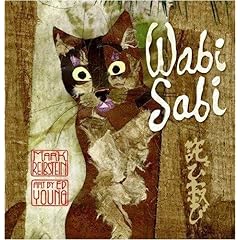I have to admit that I didn't know much about this Japanese concept of Wabi Sabi myself, so as the cat is on a quest for finding meaning, I found myself caught up completely in this quest as well. Why? Because I really didn't have any background knowledge about this concept. The book does a wonderful job introducing this concept, I now understand that Wabi Sabi is finding beauty in the ordinary things, living simply. What an extraordinary concept. And speaking of extraordinary, it is impossible not to fall in love with the illustrations: the amazing collage that brings together photographs, scruffy scraps of paper, leaves and grass, pine branches. Of course, we are talking about the work of Ed Young, whose work in Long Po Po awarded him with the Caldecott Medal. The size of the book with its large papers gives even more power to Ed Young's work.
After reading this book, I couldn't help but wanting to know more this simple Japanese concept of Wabi Sabi with its strong implications. I love when a book does that to me: makes me want to learn more. You can watch a wonderful interview here with author Mark Reibstein and illustrator Ed Young.
. 

You can also read a great review in 100 Scopenotes and A Fuse # 8 Production.
2 comments:
I think I may need to buy a copy of Wabi Sabi for our house. Thanks for the review.
I saw it recently at the bookstore, and it definitely called my attention, but I didn't buy it. Then, I've been seeing it everywhere! A sign, maybe? Thanks for reminding me to get my hands on it.
Post a Comment